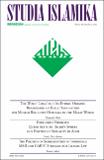The word ‘lebai’ and its ethnic origins : reassessing an early designation for Muslim religious officials in the Malay world
Abstract
This article proposes a new etymon for the Malay word lebai (minor religious official/scholar), namely the Sino-Muslim term libai (禮拜, worship or religious service conducted in a mosque). Scholars have traditionally argued that lebai, a loanword introduced during the early stages of Islamization, derives from the Tamil leppai (or lebbai), likewise signifying (amongst other things) a minor religious official/scholar. On this basis, it has been argued that Tamil Muslims acted as Southeast Asia’s earliest Islamic officials. This article critically reassesses the evidence underlying this attribution. By tracing the earliest known Malay usage of lebai to Java –where it emerged alongside Sino-Muslim influences associated with Cirebon, Gresik and Demak– the etymon libai is proposed: since the Song dynasty (960-1279), Sino-Muslims have used the noun libai as a designate for religious affairs (particularly prayers) conducted in a mosque. This study suggests that lebai originates with this term, making it indicative of Sino-Muslim influence during Java’s Islamization.
Citation
Wain , A 2021 , ' The word ‘lebai’ and its ethnic origins : reassessing an early designation for Muslim religious officials in the Malay world ' , Studia Islamika , vol. 28 , no. 2 , pp. 253-281 . https://doi.org/10.36712/sdi.v28i2.13344
Publication
Studia Islamika
Status
Peer reviewed
ISSN
0215-0492Type
Journal article
Collections
Items in the St Andrews Research Repository are protected by copyright, with all rights reserved, unless otherwise indicated.

